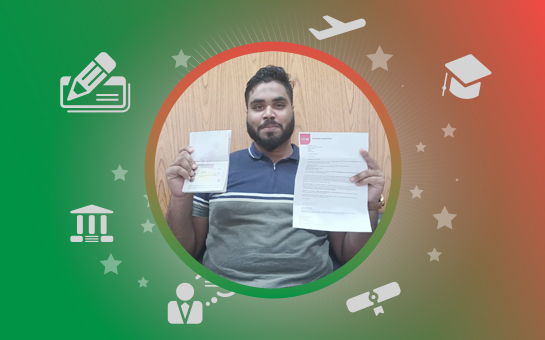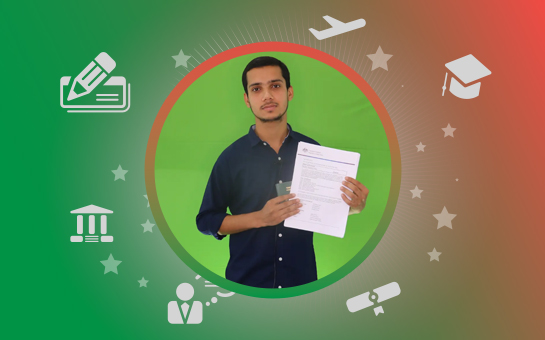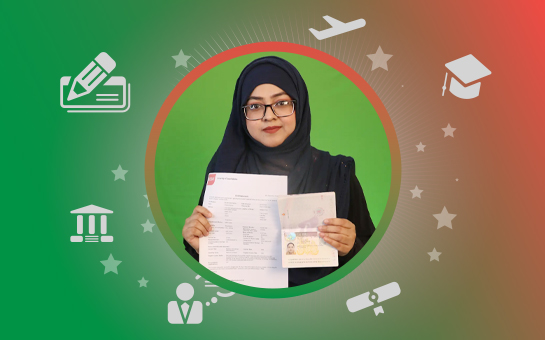Don't overdo it: How to ace your IELTS speaking test
IELTS stands for the International English Language Test System. You
must take the IELTS exam if you want to study in various countries
worldwide, including the UK and USA. IELTS tests are conducted on 4
subjects. One of them is the speaking test. This blog
`Don't overdo it: How to ace your IELTS speaking test’ is written for those who are worried about getting good results
on the speaking test.
In this blog, we have highlighted tips for passing the speaking test
easily. How to prepare and register for the IELTS exam is discussed
in detail here. Dive into the blog to learn more about the IELTS
exam.
Meet Our Consultant
6 effective tips on how to pass the IELTS speaking test
Here are mentioned 6 effective tips on how to ace your IELTS
speaking test. Scroll down to read the tips in detail.
1. Familiarize yourself with common topics
Become familiar with common topics. Try to practice English every
day about travel, hobbies, and essential conversations. This will
increase both your confidence and your ability to speak English.
2. Use everyday vocabulary
It is not possible to speak English without knowing the vocabulary.
That's why you need to learn new vocabulary every day to increase
your vocabulary. First, learn the English words that we have to say
every day. Then learn uncommon English words. As you learn
vocabulary, you need to practice it. Then you can easily assimilate
it.
3. Structure your responses
Practice how to organize and explain the answer to any question in
detail. When you can answer common questions in a structured and
simple manner, answering tricky questions will also become easier
for you.
4. Practice speaking fluently and clearly
Speak English every day. Speaking English every day will increase
your fluency and eliminate grammatical errors. As a result, it will
be easier for you to get the desired results in the IELTS Speaking
test.
5. Use a range of sentence structures
When you speak, use simple, compound, and complex sentences. Then
you will not have any inertia while speaking and no sentence
structure will seem difficult.
6. Stay calm and engaged
When taking the test, stay calm. Look the examiner in the eye and
speak. Keep a smile on your face, but don't laugh. If you don't
understand a question, request the examiner to repeat it, for
example: "Could you please repeat that?" or "Could you explain what
you mean by...?"
How to prepare for the IELTS exam?
To do well in the IELTS exam, you need to prepare very well. How you
can prepare properly is mentioned below.
Understand the test format
The IELTS exam has a specific format. When you plan to take the
exam, you must have to know clearly about this format.
Set a study plan
There are 4 subjects in the IELTS exam. Plan when you will study
each subject each day and study according to your plan.
Improve your English skills daily
There are 4 subjects to be tested in IELTS.
- Reading
- Writing
- Speaking
- Listening
To get the best results in the IELTS exam, you need to be skilled in
each subject.
Take practice tests
Before taking the main exam, take various tests and mock tests. This
will help you understand your quality.
Take the exam after you feel confident
After taking various tests and model tests, when you feel confident
that you can now appear for the main exam. Then you can achieve good
results by participating in the main exam.
How to register for the IELTS test?
Registering for the IELTS test in Bangladesh is an easy process.
Here is a step-by-step guide:
1. Choose the right test type
There are 3 types of IELTS. So, while registering, you first need to
select the type of IELTS.
-
IELTS Academic: For higher education or professional
registration.
-
IELTS General Training: For migration or employment
purposes.
-
IELTS for UKVI: For UK visa and immigration applications.
2. Select your test center
The British Council and IDP Education are the official providers of
IELTS in Bangladesh. Both of these organizations have test centers
in Dhaka, Chittagong, Sylhet, Rajshahi, and Khulna. When
registering, select the center that is most convenient for you to
take the test.
3. Register online
You can easily register for the IELTS test online. Below is a
step-by-step guide:
For British Council:
- Visit the official website.
- Click on the IELTS registration page.
- Select IELTS type, center, and date.
- Provide required documents (like a valid passport).
- Fill up the online form accurately.
For IDP Education:
Registration here also follows the same procedure as registration at
the British Council.
4. Pay the test fee
Currently (2025) the
IELTS exam
fee in Bangladesh is 24,950 taka. The names of the selected
banks are given on the websites of both the British Council and IDP
Education, the money has to be paid to these banks.
There are also other payment options, payment can be made through
these options too.
5. Receive confirmation
Once your registration and payment are processed, you'll receive a
confirmation email with your:
- Test date
- Venue details
- Test day instructions
Planning to take the IELTS exam to study abroad?
Are you planning to take the IELTS test to
study abroad?
Contact
Sangen Edu Ltd. As the best education consultancy
firm in Bangladesh, we provide students with all kinds of
guidelines for
higher education abroad. With our help, many students are already
studying abroad and doing well there. We are committed to fulfilling
your dreams by sending you abroad for higher education.
Frequently Asked Questions
The IELTS Speaking Test has three parts:
-
Introduction & Interview: Questions about yourself,
your home, studies, or work.
-
Cue Card (Long Turn): You’ll speak for 1–2 minutes
on a given topic.
-
Discussion: A two-way discussion with the examiner
based on the topic from the cue card.
The test takes about 11–14 minutes in total.
- Speak naturally without long pauses.
- Practice expressing your thoughts clearly.
- Avoid memorized answers, as they can sound robotic.
The test is scored on four criteria:
- Fluency and Coherence
- Lexical Resource (Vocabulary)
- Grammatical Range and Accuracy
- Pronunciation
Politely ask the examiner for clarification, such as:
- "Could you please repeat that?"
- "What do you mean by...?"













